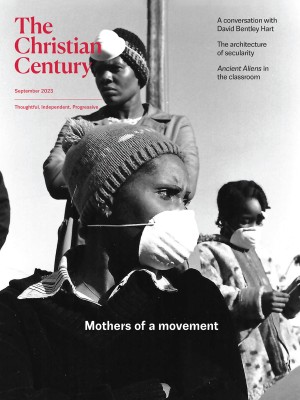September 17, Ordinary 24A (Exodus 15:1b–11, 20–21)
Miriam’s song of victory prepares hearts to trust God in an uncertain future.
As a descendant of enslaved africans who toiled in the American South for generations, singing and praying to God for deliverance from bondage, I have always had a soft spot for the Exodus story. I must admit, however, that too often I have conceptualized this saga as the story of Moses, lifting up one person—one man—while basically ignoring the presence of figures like Miriam.
In this passage it is impossible to ignore her. We hear directly from the mouth of the singing prophetess—whom God has already used extravagantly throughout the drama of Exodus, first to watch over her vulnerable newborn brother and then to wisely assure their family’s financial security with Pharaoh’s funds. Now she leads the people in triumphant tones and defiant dancing.
Read our latest issue or browse back issues.
Sadly, in overlooking Miriam I have much company throughout the history of biblical interpretation. God, however, sees her straight on. Blessedly, the averted eyes of the powerful never erase the sacred worth of the unseen. Moreover, in God’s wild wisdom, Miriam happens to be a master of subverting the patriarchal and misogynistic gaze (and non-gaze) that inadvertently leaves her the space to flourish and to help free herself and others while the watching eyes are wide shut. Like so many other enslaved women, Miriam is able to sing and pray the kingdom of heaven down to earth, while the powers that be ignore it as just the noise of a girl or a woman.
Here, in some of the oldest writing in scripture, Miriam’s song of victory lifts and leads the people of God in reflection on God’s marvelous deeds in their recent past as they prepare their hearts to trust God with their uncertain future. After the writer records Moses’ song painstakingly, line by line, only a few of Miriam’s poetic words are recorded. They are there though, and they become marching orders and a mantra for the prophetesses, wailing women, and other daughters of destiny whom God will raise up in the spirit of Miriam for generations to come. Miriam dances and exults at the banks of the Red Sea: “Sing to the LORD, for he has triumphed gloriously; horse and rider he has thrown into the sea.”
In her own voice, apart from the shadow of Moses and of Aaron—whom Wil Gafney points out is only Moses’ prophet, while Miriam is God’s—Miriam lifts a song of total jubilation at the water’s edge.
Every time I read of the life of Miriam, I think of watching the historical drama film Nightjohn, based on Gary Paulsen’s novel, as a preteen. The gripping story of a young enslaved girl named Sarny navigating life on a plantation in the antebellum South was mesmerizing in its depiction of the way such girls were literally unseen and unheard. By the end of the film the reluctant hero, who is originally overlooked and assumed to be almost a nonperson because trauma has rendered her mute, proves to be powerful beyond measure.
In the dramatic climax, after learning to read and write Sarny reluctantly but bravely faces a gun-wielding master, armed with the knowledge of her and her compatriots’ monetary value, which she discovered by secretly reading their purchase prices in her master’s ledgers. With this new knowledge and her newly found voice, she speaks up boldly to the master, whom the enslaved on the plantation previously characterized as “richer than God,” knowing now that they are the only great wealth of that place.
It is Sarny’s words that free their souls even as they wait for the liberation of their bodies. Aptly, this is most dramatically underpinned when many of the enslaved people of the plantation stand tearfully in a final scene, in the segregated balcony of the master’s church, and sing together the words of Miriam as Master Waller recoils powerlessly in the face of their new sense of value. “Sing to the Lord” they intone, rejoicing melodiously, “for horse and rider he has hurled into the sea.” A slave girl leads them.
Likewise in our text, memorializing God’s deeds with tambourine and voice, dancing and theologizing in the sweet tones of poetic verse, Miriam makes herself seen and heard by all the nation of God. Beautifully, all the women go out with her, lifting their voices in prophetic harmony. They praise God with her, knowing her story, and they rejoice with her as she rejoices after a lifetime of God’s faithfulness, from the slave quarters to the precipice of the promised land. The people take hope and strength from the formerly overlooked, unheard, enslaved girl, helping to lead the nation to God’s preferred future in her own right and with her own voice.






